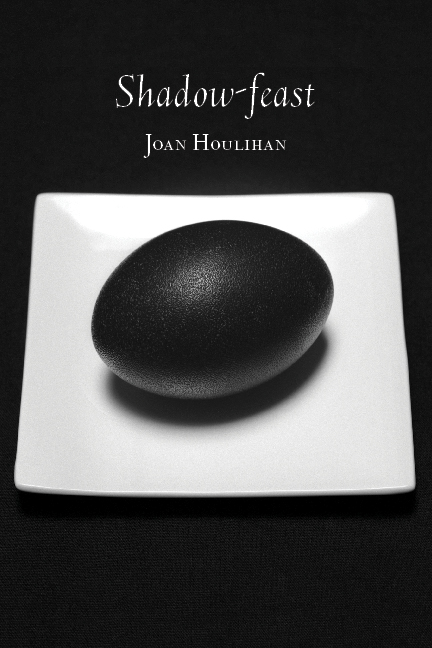
paper • 64 pages • 15.95
ISBN-13: 978-1-945588-08-2
Shadow-feast is a chronicle of dying—the awareness, denial, pain, and hope surrounding incurable illness, as well as the aftermath of grief as told from three points of view: Hers, His, and Theirs (the couple). The collection as a whole is a Kage-zen, or Shadow-feast, a traditional Japanese meal offered to the dead. However, here it is set out not for an absent beloved, but for the reader.
From Shadow-feast:
BREATH THEY COULDN’T catch, motion that fell
as a run of shadow on their window
folded into one wish. Time—what was that—
flung over mountains where sun could blink and waver it off.
Clouds muscled in to not let them see the bald sky lying.
The knife-cold privacy exposed a man, and from his window
no motion, just New England birch, stripped limbs in late light.
“Shadow-feast, the deft, wrenching title of this collection, inspired by the enigmatic internationalist writer Lafcadio Hearn, provides one of many keys to experiencing the meticulous linguistic ‘ceremony’ and rich ‘repast’ of Joan Houlihan’s singular work. These are urgent and fiercely incorruptible lyrics where the unsettlingly oblique and surreal is juxtaposed against moments of lucid and visceral anguish: ‘We had married ourselves to a trance.’ And ‘When they came for him full-dressed / and somber, they lifted a body made lighter / by suffering, laid it into the rubber bag / then zipped it to the top of his head.’ Who writes with this kind of prescient confidence and startling lyricism besides Joan Houlihan? Emily Dickinson, Ludwig Wittgenstein, and Harryette Mullen come to mind.”—Peter Covino
“COME TO THE WAIT and the sea/flexes sleek in the sun,” Joan Houlihan tells us, and we sense the subtle disruption of our expectations of normalcy. Her small imposition of the article (“the” wait) telegraphs that we’ve entered an alternative sense of time, one in which we’ve “come to,” as if from the sleep of expected usage. Here, also, in form: this poem’s lines are split in two as if each next moment must be paused over, pondered, as one ponders any dangerous step forward into change. Form in this work, like time, does not operate in easy coherence with what we expect. We “come to” in each poem, awakened to the enormity that, at any instance, all may become nothing we expect, an awareness lived daily by those facing an encroaching death—an awareness performed in many formal shifts, as well as described in the voices of “hers,” “his,” and finally “theirs,” each deftly drawn, their images held from one another, yet only together do they offer a full sense of what it means to live through a loss. We find ourselves intuitively responding to every, even the least, “flexing” of form, suggesting both in shifts and in recurrences how the coming of a death offers this constancy: all will become foreign, all hopes and self-protective devices will be violated. Each image is spare and resonate, and will remain etched in this reader’s mind. “He will not move. At dawn birds come up,/and the smell of rain-eaten dirt.”—Rusty Morrison
“To say that Houlihan is a unique voice in American poetry is an understatement. The work is breathtakingly inventive and yet deeply humane. In the time when so many poets create linguistic fireworks that possess little, if any, emotive depth, Houlihan gives us a poetry of passion and lyric attentiveness that is rich in its textures, lyric tonalities, and rhythmic, memorable speech.”—Ilya Kaminsky
“…The speaker avoids the ordinary and with perfect craft and words that behave just right, she creates new forms for loss — and loss is gradual here allowing the poems to track demise in the richness of its grain. Grief is unbelievable yet Houlihan has to believe and makes us handle it the way she handled the lathe, page by page. Critics compare her to Emily Dickinson and I think I know why. They each distill language and feeling to a crystalline state that never tells a lie. Reading Houlihan reminds me of why I first loved poetry.” Read the full review.
“…a stunning poetry array on the death of her beloved….” Read the full review.
“…Houlihan’s language is stripped of all connective tissue, leaving minimal punctuation and deliberate use of idiosyncratic spacing to convey meaning….” Read the full review.
“Shadow-feast is a tour de force sheared of excess, breathtaking in its leaps, and thrilling in its sonic resonances. Joan Houlihan touches uncannily on the hidden pulse of experiencing her husband’s death. The perspectives that form the three sections, Hers, His, Theirs, evidence Houlihan’s ability to discern the distance from and proximity of each to each….” Read the full review.